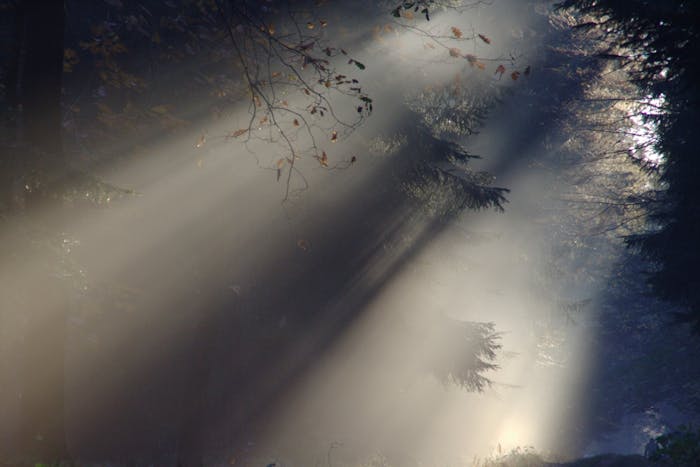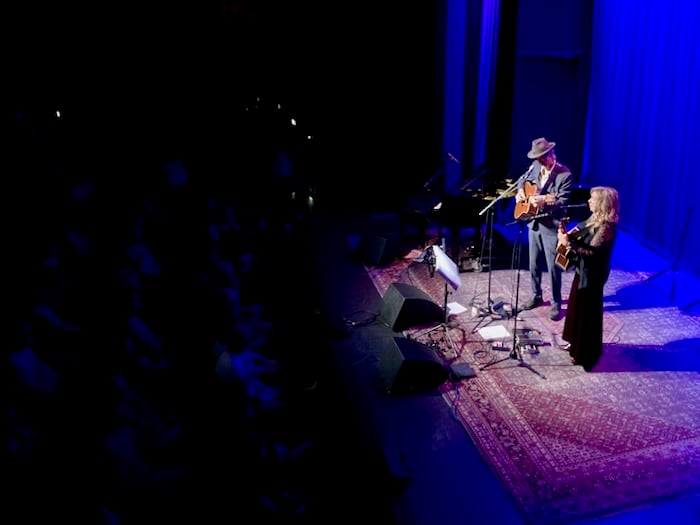Advent Shadows
Facing reality, finding Christ

There is no land of promise here
There’s only wilderness
You may not recognize this place
You live here nonetheless (Over the Rhine, “May God Love You”)
On Thursday, Maggie and I drove up to the Old Town School of Folk Music for Over the Rhine’s Christmas concert. We’ve enjoyed this husband and wife band for about twenty years and have been to a few of their Christmas shows. It’s been a while since we last saw them and it was good to be back and to bump into a number of friends from around the city.
I’m not sure what you picture when you hear “Christmas concert” but this one was less full of cheer than you might imagine. A running joke throughout the show was that Karin Bergquist and Linford Detweiler write reality Christmas songs. The songs, as exemplified in the lyric above, can be bracing and full of shadows. It would be less marketable, but I think it might be truer to think of these as Advent songs.
Advent, the pre-Christmas season we’re almost a week into, is the time Christians stare honestly into the yawning gap between our Lord’s first and second coming. It’s the time to acknowledge how utterly incapable we are of rescuing ourselves. One of this week’s lectionary readings captures our dilemma as a question. Having been invited by God leave their sins behind and return to him, the people ask, “How shall we return?” (Malachi 3:7) It sounds to me like a question which doesn’t expect an answer. The people’s despair over anything they might do to return to their God makes theirs a rhetorical response.
This is the sort of honesty we typically strain to avoid. How much of our over-worked, over-entertained, and over-sedated ways of living can be attributed to the fear of siting quietly with our inability to save ourselves? Another of this week’s readings pleads with God, “Teach us to count our days that we may gain a wise heart.” (Psalm 90:12) But is wisdom reward enough for us to contend with our mortality? Our contemporary situation would suggest it isn’t, but Advent won’t let us escape the basic facts of failing flesh, unceasing wars, and violence without end.
John the Baptist is Advent’s thundering, provocative voice. On Sunday, churches around the world will hear him denounce the religious leaders of his day – “You brood of vipers!” – and we’ll know exactly what he means, surrounded as we are by liars, thieves, and their energetic promoters. We know also that the poison has seeped into our own sin-compromised hearts. Those willing to ease into the creeping winter shadows find the degrees of our trouble revealed as our squinting eyes adjust in the dimming light: corruption, violence, deceit and their flip-sides: despair, more violence, and cynicism.
It’s understandable why we’d do absolutely anything to keep from counting our days; it seems the only sane thing to do in order to, you know, get out of bed each morning. I consider the coming years and hear Karen’s voice on one of my favorite Over the Rhine tracks, “Lord knows we've learned the hard way all about healthy apathy.”
The problem with apathy and its cynical cousins isn’t only that we’re left contenting ourselves with temporarily comforting illusions. The real trouble with dodging reality is that we end up missing the Light shining in the shadows, the Light which, no matter how faint it appears at a particular moment, cannot be overtaken by the darkness.
And this, more than the harsh realities it exposes, is Advent’s true gift. We don’t stare into the void hoping to prove our mettle or looking to dance with the devil. No, we exchange promised land propaganda for wilderness wisdom because we expect to find God here, in the wilds of the world as it actually is: troubled and troubling, failed and failing, broken and breaking. Aching bodies, struggling friendships, manipulative workplaces, coercive governments, and whatever shape the shadows have taken for you these latter days– these end up being precisely the kinds of ruins lit up by the Christ who makes his home among wrecked people like you and me.
Is it enough, the promise of a God who accompanies us, as Psalm 90:15 puts it, through “as many years as we have seen evil”? I find myself wishing for something more definite. Especially these days, I’d like convincing evidence of evil’s demise. But the witness of the Advent people who’ve gone before us is that, until his return, Christ with us is enough. A people learning to find hope not by escaping reality but by entering fully into it testify that there is no shadow so long, no wilderness so desolate, no sin so sustained, and no evil so total as to resist the Word becoming flesh and making his home among us.
And this, I think, is what makes Karen and Linford’s “May God Love You” an Advent song. Because, while it’s quick to confess our wilderness with all of its bruising and sadness, the song can also include the blessing, “May God love you like you’ve never been loved.” It turns out that, even as we wait for the fullness of love at our Lord’s return, his presence with us in our waiting days is enough, more than enough. It is the best possible news for those willing to confess the impossibility of saving ourselves. So to their Advent blessing let me add one of my own: May God lead you into the shadows to his very self.
(Photo credit: Pixabay.)
The View From Here

Our first-row balcony seats for the concert were great. In addition to the unobstructed view, we spied a friend from church below who had a front row seat who we got to catch up with after the show.